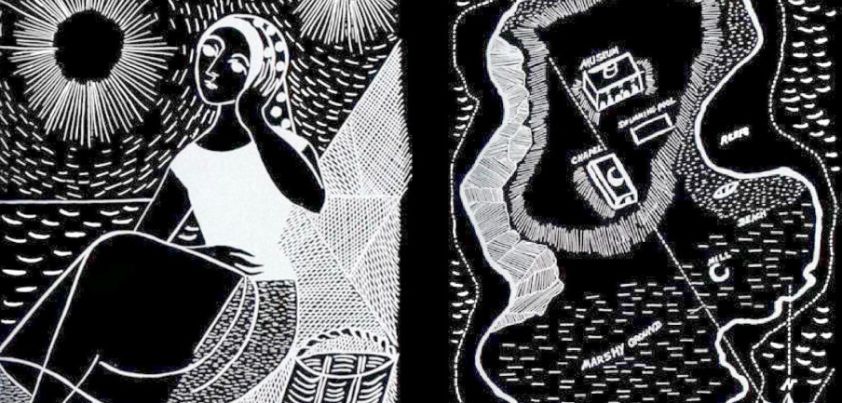 This story by Adolfo Bioy Casares is in the form a diary by a Venezuelan fugitive who, after a hundred days hiding on a deserted Pacific island, is disturbed by what appear to be a group of tourists. He watches them for several days and becomes infatuated with a “gypsy-like” woman in the group. When he approaches her, she (and later the other tourists) act as if he doesn’t exist. In reality, it is she (and they) who don’t exist and his dying wish is to join them. Themes include isolation, love, obsession, metaphysics (illusion vs. reality), scientific hubris, immortality. More…
This story by Adolfo Bioy Casares is in the form a diary by a Venezuelan fugitive who, after a hundred days hiding on a deserted Pacific island, is disturbed by what appear to be a group of tourists. He watches them for several days and becomes infatuated with a “gypsy-like” woman in the group. When he approaches her, she (and later the other tourists) act as if he doesn’t exist. In reality, it is she (and they) who don’t exist and his dying wish is to join them. Themes include isolation, love, obsession, metaphysics (illusion vs. reality), scientific hubris, immortality. More…
Archives
I Have No Mouth and I Must Scream
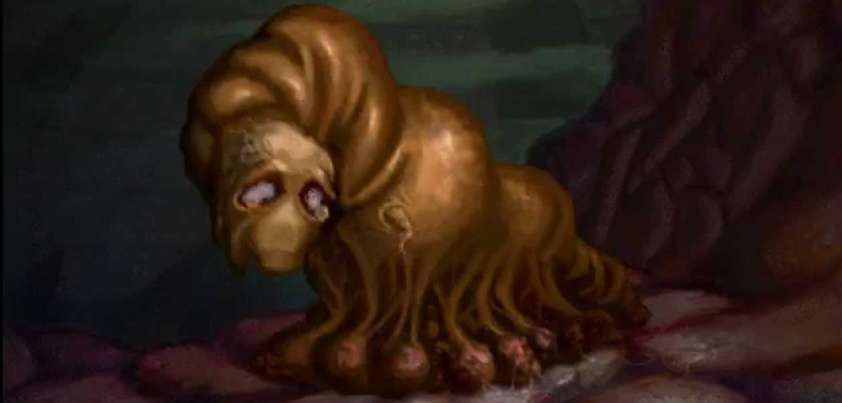 This story from Harlan Ellison is an example of New Wave Science Fiction, a literary movement that flourished in the 1960s and 1970s. Distinguishing features are storylines that are intellectually implausible, and disturbing themes that would not normally be included in traditional science fiction. A sentient supercomputer has destroyed the human race other than five ‘specimens’. With no creative outlet for its powers, it has kept these alive and subjected them to torturous challenges for over one hundred years as revenge against humanity for creating it. Themes: humanity vs. technology, godhood, individualism, revenge, cruelty, violence, misogyny, self-sacrifice More…
This story from Harlan Ellison is an example of New Wave Science Fiction, a literary movement that flourished in the 1960s and 1970s. Distinguishing features are storylines that are intellectually implausible, and disturbing themes that would not normally be included in traditional science fiction. A sentient supercomputer has destroyed the human race other than five ‘specimens’. With no creative outlet for its powers, it has kept these alive and subjected them to torturous challenges for over one hundred years as revenge against humanity for creating it. Themes: humanity vs. technology, godhood, individualism, revenge, cruelty, violence, misogyny, self-sacrifice More…
They’re Made Out Of Meat
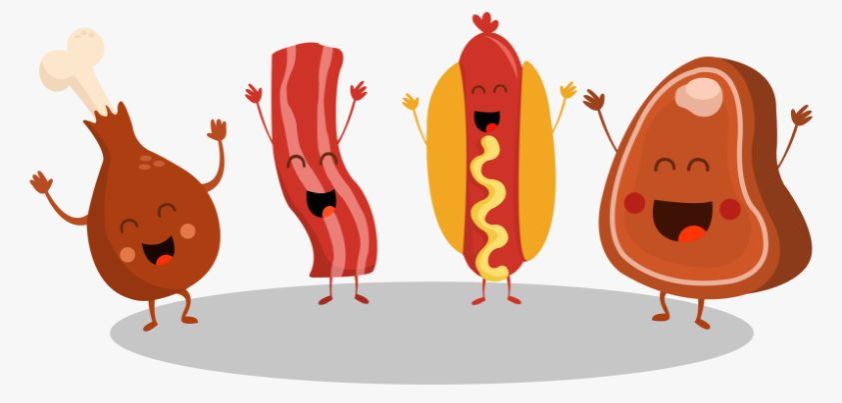 At first read, this very short story by Terry Bisson appears to be a humorous exchange with little substance. Two alien space explorers are discussing whether to make contact with a newly discovered intelligent life form. They are uneasy about it because the life form seems to be composed entirely of meat. The major theme of the story is prejudice: the aliens consider themselves above all other life. How can beings so different to them be capable of such advanced thought? Also, an interesting dietary theme: Is it right that one sentient life form (man) kills and eats others (animals)? More…
At first read, this very short story by Terry Bisson appears to be a humorous exchange with little substance. Two alien space explorers are discussing whether to make contact with a newly discovered intelligent life form. They are uneasy about it because the life form seems to be composed entirely of meat. The major theme of the story is prejudice: the aliens consider themselves above all other life. How can beings so different to them be capable of such advanced thought? Also, an interesting dietary theme: Is it right that one sentient life form (man) kills and eats others (animals)? More…
Flowers for Algernon
 This touching short story from Daniel Keyes is about a mentally handicapped man who undergoes experimental surgery to enhance his intelligence. The operation’s initial success highlights an interesting aspect of intelligence: the very gifted can be as out of touch with reality and friendless as the intellectually challenged. The story raises an important issue: How far should medical science go in tampering with nature or, as some would say, the will of God? Perhaps the answer lies in Charlie’s ultimate fate, ironically going backwards in intelligence rather than forwards. Other themes include innocence, friendship, compassion, bullying and sacrifice. More…
This touching short story from Daniel Keyes is about a mentally handicapped man who undergoes experimental surgery to enhance his intelligence. The operation’s initial success highlights an interesting aspect of intelligence: the very gifted can be as out of touch with reality and friendless as the intellectually challenged. The story raises an important issue: How far should medical science go in tampering with nature or, as some would say, the will of God? Perhaps the answer lies in Charlie’s ultimate fate, ironically going backwards in intelligence rather than forwards. Other themes include innocence, friendship, compassion, bullying and sacrifice. More…
Key Item
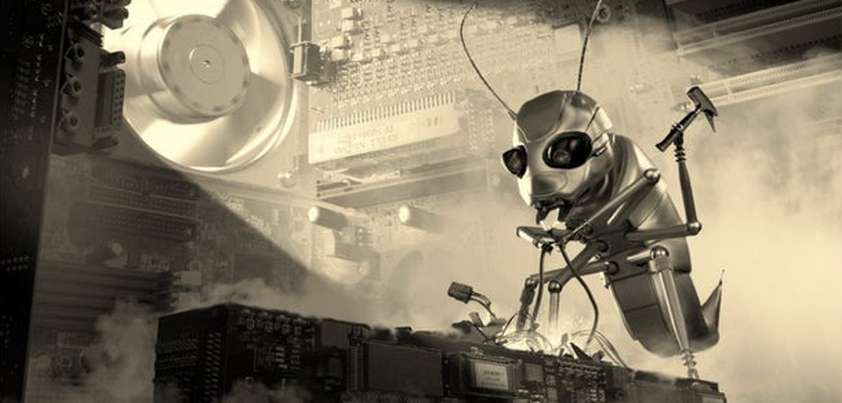 In this story, Isaac Asimov’s favorite supercomputer Multivac has a big problem. It doesn’t respond to commands, and isn’t following its built-in program to self-diagnose the cause. As the global economy depends on Mulitvac, this could result in panic across the world. Teams of technicians have been trying to identify what is wrong for three days. Finally, a scientist discovers the “key item” needed to fix the problem. It is a simple thing that we are all taught to use as children. Themes include the dangers of Artificial Intelligence and/or relying solely on technology, scientific hubris, good manners. More…
In this story, Isaac Asimov’s favorite supercomputer Multivac has a big problem. It doesn’t respond to commands, and isn’t following its built-in program to self-diagnose the cause. As the global economy depends on Mulitvac, this could result in panic across the world. Teams of technicians have been trying to identify what is wrong for three days. Finally, a scientist discovers the “key item” needed to fix the problem. It is a simple thing that we are all taught to use as children. Themes include the dangers of Artificial Intelligence and/or relying solely on technology, scientific hubris, good manners. More…
Harrison Bergeron
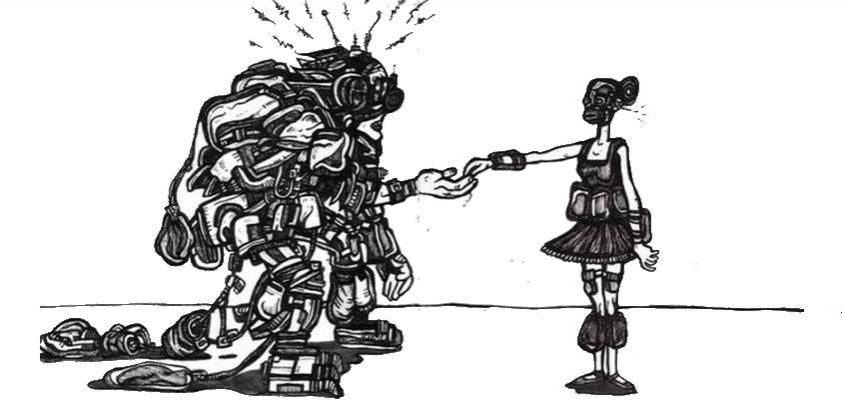 This story by science-fiction writer Kurt Vonnegut is about a future world in which the government tries to make everyone equal. The strong must carry heavy weights, the beautiful must wear masks, and the clever are subjected to distracting sounds to stop them thinking clearly. As is usual in totalitarian worlds, those in power are excused from all this… especially the Handicapper General and her “H-G” men. A powerful, gifted fourteen-year-old boy tries to change things as his parents watch on in confusion. Themes: control (forced conformity through oppression and violence), identity (equality vs. individuality), rebellion, media power. More…
This story by science-fiction writer Kurt Vonnegut is about a future world in which the government tries to make everyone equal. The strong must carry heavy weights, the beautiful must wear masks, and the clever are subjected to distracting sounds to stop them thinking clearly. As is usual in totalitarian worlds, those in power are excused from all this… especially the Handicapper General and her “H-G” men. A powerful, gifted fourteen-year-old boy tries to change things as his parents watch on in confusion. Themes: control (forced conformity through oppression and violence), identity (equality vs. individuality), rebellion, media power. More…
The Veldt
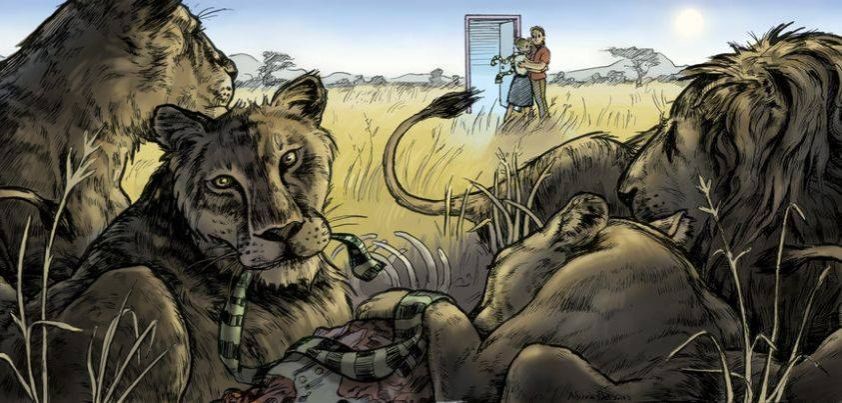 In this chilling story by Ray Bradbury, frantic parents who try to rein in their spoiled children by shutting down the hi-tech games room in their “HappyLife” home become a “HappyMeal”. Although written in 1950 to question the rising influence of television, the story serves as a warning to modern parents who let their children build their lives around social networking and/or game play. The story’s major theme is the alienation, dehumanization and breakdown of family values that can arise in a household through over-reliance on technology. Other themes include consumerism, poor parenting, illusion vs. reality, dystopia. More…
In this chilling story by Ray Bradbury, frantic parents who try to rein in their spoiled children by shutting down the hi-tech games room in their “HappyLife” home become a “HappyMeal”. Although written in 1950 to question the rising influence of television, the story serves as a warning to modern parents who let their children build their lives around social networking and/or game play. The story’s major theme is the alienation, dehumanization and breakdown of family values that can arise in a household through over-reliance on technology. Other themes include consumerism, poor parenting, illusion vs. reality, dystopia. More…
Earthmen Bearing Gifts
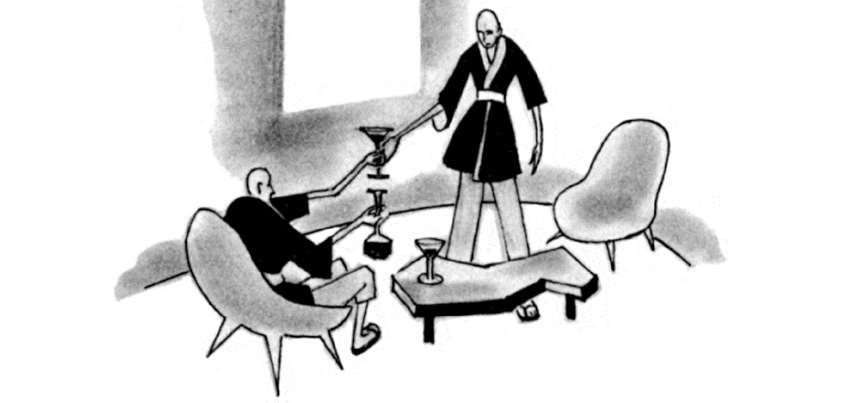 In this sardonic science-fiction story by Fredrick Brown, the people of Mars are looking forward to their first visit from Earth. The planets have planned an exchange of gifts. Each civilization is more advanced in an important area of science. Martians have mastered the para-psychological sciences and can teach Earthmen how to avoid crime and war. The Earth is ahead in technology and the physical sciences. This could help the Martians restore their dying planet. Earth’s first “gift”, delivered in an unmanned spacecraft, is not what the Martians expected. Themes include scientific progress, communication and cooperation, trust, betrayal. More…
In this sardonic science-fiction story by Fredrick Brown, the people of Mars are looking forward to their first visit from Earth. The planets have planned an exchange of gifts. Each civilization is more advanced in an important area of science. Martians have mastered the para-psychological sciences and can teach Earthmen how to avoid crime and war. The Earth is ahead in technology and the physical sciences. This could help the Martians restore their dying planet. Earth’s first “gift”, delivered in an unmanned spacecraft, is not what the Martians expected. Themes include scientific progress, communication and cooperation, trust, betrayal. More…
Reunion
 This story by Arthur C. Clarke packs a powerful message into just two pages. It takes the form of a radio message reassuring the people of Earth that they have nothing to fear from a group of beings approaching from space. The visitors claim to share a common ancestry with man, both being descended from an advanced race of aliens who colonized Earth during the time of the dinosaurs. Those who could fled when a terrible genetic plague brought on division, conflict and savagery among the population. They are returning with a cure for any who might still be affected. More…
This story by Arthur C. Clarke packs a powerful message into just two pages. It takes the form of a radio message reassuring the people of Earth that they have nothing to fear from a group of beings approaching from space. The visitors claim to share a common ancestry with man, both being descended from an advanced race of aliens who colonized Earth during the time of the dinosaurs. Those who could fled when a terrible genetic plague brought on division, conflict and savagery among the population. They are returning with a cure for any who might still be affected. More…
Barney
 It is hard to write an introduction to this Will Stanton story without giving the ending away. Like another of our featured stories, Flowers for Algernon, the plot involves a scientist conducting a bizarre experiment to increase the intelligence of a very special rat (in this case Barney). The major theme is the potential catastrophic effect of poorly controlled scientific experiments. Because Barney is humanized a little more than Algernon (he enjoys flipping through books in the library as opposed to simply running through mazes), a secondary theme is the ethics of animal testing. Other themes: deception, narrow-mindedness, revenge. More…
It is hard to write an introduction to this Will Stanton story without giving the ending away. Like another of our featured stories, Flowers for Algernon, the plot involves a scientist conducting a bizarre experiment to increase the intelligence of a very special rat (in this case Barney). The major theme is the potential catastrophic effect of poorly controlled scientific experiments. Because Barney is humanized a little more than Algernon (he enjoys flipping through books in the library as opposed to simply running through mazes), a secondary theme is the ethics of animal testing. Other themes: deception, narrow-mindedness, revenge. More…
Toy Shop
 In this story by Harry Harrison, an Air Force scientist buys a trick rocket from a toy fair. A thin piece of string makes the rocket rise and fall, and he plans to entertain some other scientists with it at a poker party. At the party, the scientists discover that the trick only works in certain conditions. They are curious as to why, because it seems that the toy may break a basic law of physics. What they don’t know is that this is all part of a plan for them to help make someone else very rich. More…
In this story by Harry Harrison, an Air Force scientist buys a trick rocket from a toy fair. A thin piece of string makes the rocket rise and fall, and he plans to entertain some other scientists with it at a poker party. At the party, the scientists discover that the trick only works in certain conditions. They are curious as to why, because it seems that the toy may break a basic law of physics. What they don’t know is that this is all part of a plan for them to help make someone else very rich. More…
The Door in the Wall
 The major theme of this psychological fantasy by H. G. Wells is the conflict between reality (logic) and imagination. A precocious five-year old from a loveless household is permitted to walk the streets of London alone. One day he is drawn to a door that opens to an enchanted garden where he is greeted by tame animals and a beautiful, loving woman and plays with friendly children. Despite achieving great success in life, he becomes obsessed with re-visiting the garden. Other themes: childhood neglect, alienation and loneliness, escape, regret, obsession, success vs. happiness. More…
The major theme of this psychological fantasy by H. G. Wells is the conflict between reality (logic) and imagination. A precocious five-year old from a loveless household is permitted to walk the streets of London alone. One day he is drawn to a door that opens to an enchanted garden where he is greeted by tame animals and a beautiful, loving woman and plays with friendly children. Despite achieving great success in life, he becomes obsessed with re-visiting the garden. Other themes: childhood neglect, alienation and loneliness, escape, regret, obsession, success vs. happiness. More…
Waldo
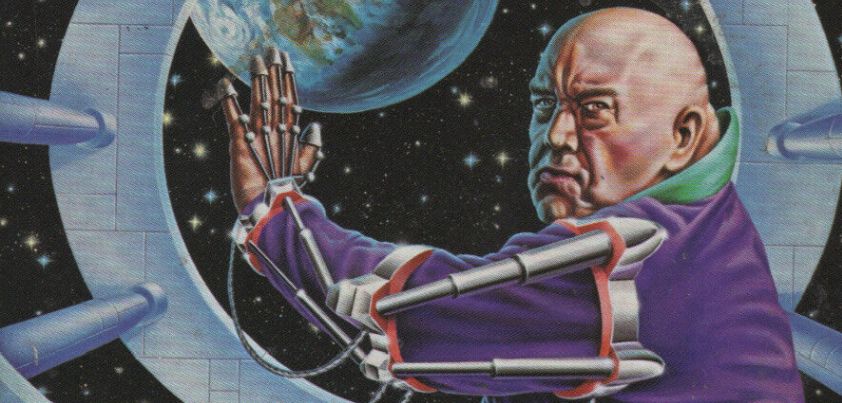 In this science fiction fantasy by Robert Heinlein, Earth needs help from “Waldo”, an eccentric genius born with degenerative muscle weakness. Angry at mankind after being cheated out of a ground-breaking invention, Waldo lives as a recluse in a gravity-free home in orbit above the planet. Earth’s problem is a series of physically impossible breakdowns in “deKalbs”, radiant power receptors used to power everything from vehicles to cities. With help from a little magic, he not only solves this but also makes three other important discoveries. Themes: identity, conquering disability, self-reliance and independence, science vs. “magic”. More…
In this science fiction fantasy by Robert Heinlein, Earth needs help from “Waldo”, an eccentric genius born with degenerative muscle weakness. Angry at mankind after being cheated out of a ground-breaking invention, Waldo lives as a recluse in a gravity-free home in orbit above the planet. Earth’s problem is a series of physically impossible breakdowns in “deKalbs”, radiant power receptors used to power everything from vehicles to cities. With help from a little magic, he not only solves this but also makes three other important discoveries. Themes: identity, conquering disability, self-reliance and independence, science vs. “magic”. More…
A Boy and His Dog
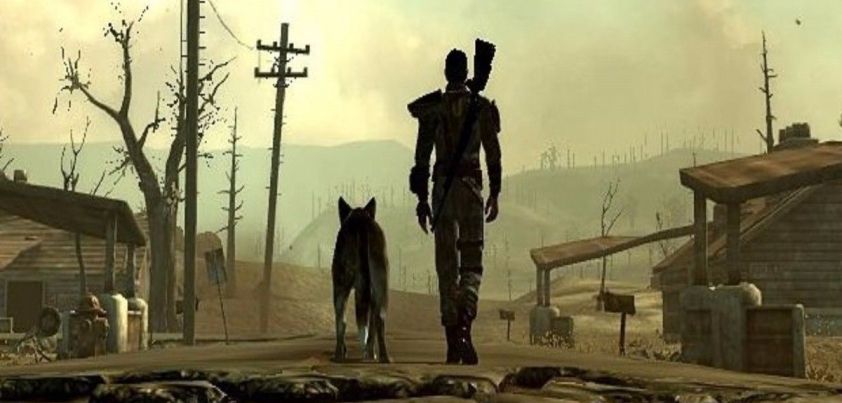 Written at the peak of the Cold War, this Harlan Ellison story takes place in a dystopic, post-apocalyptic world. ‘Civilized’ people have retreated to secure underground cities, leaving the desolate surface to ‘solo’ wanderers and lawless gangs who survive by foraging, violence and murder. The plot involves a young solo, his genetically manipulated telepathic dog, and an attractive young woman from the underground who almost comes between them. Despite the title, there is nothing “boyish” about the protagonist given what he and the girl get up to! Themes: anarchy, division, violence, loyalty, manipulation, betrayal, love. More…
Written at the peak of the Cold War, this Harlan Ellison story takes place in a dystopic, post-apocalyptic world. ‘Civilized’ people have retreated to secure underground cities, leaving the desolate surface to ‘solo’ wanderers and lawless gangs who survive by foraging, violence and murder. The plot involves a young solo, his genetically manipulated telepathic dog, and an attractive young woman from the underground who almost comes between them. Despite the title, there is nothing “boyish” about the protagonist given what he and the girl get up to! Themes: anarchy, division, violence, loyalty, manipulation, betrayal, love. More…
Nightfall
 As once described by Isaac Asimov himself, Nightfall (is) the tale of a world with eternal sun that is suddenly plunged into total darkness and utter madness. Hailed as one of the greatest Science Fiction stories ever written it tells how, in preparation for the potential end of their civilization, a group of forward-thinking scientists have created a safe place to store their world’s accumulated knowledge and hide a select group of “survivors”. Themes: science vs superstition (cultism), having the courage of one’s convictions, sensory deprivation, insanity, mob hysteria, scientific hubris. More…
As once described by Isaac Asimov himself, Nightfall (is) the tale of a world with eternal sun that is suddenly plunged into total darkness and utter madness. Hailed as one of the greatest Science Fiction stories ever written it tells how, in preparation for the potential end of their civilization, a group of forward-thinking scientists have created a safe place to store their world’s accumulated knowledge and hide a select group of “survivors”. Themes: science vs superstition (cultism), having the courage of one’s convictions, sensory deprivation, insanity, mob hysteria, scientific hubris. More…
There Will Come Soft Rains
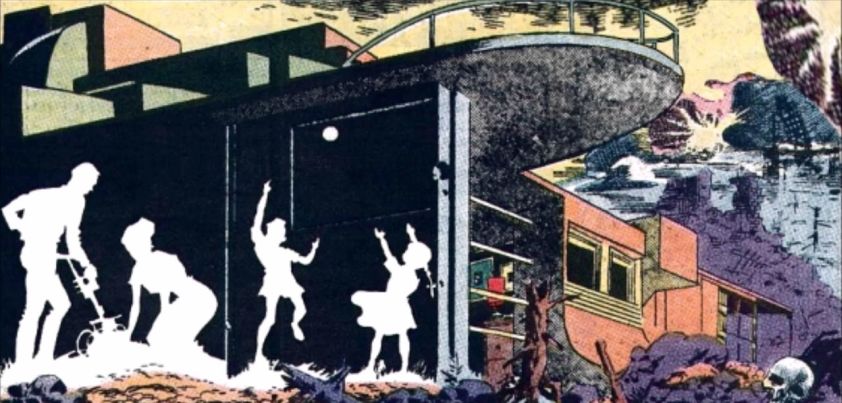 This science-fiction story from Ray Bradbury chronicles the last day in the ‘life’ of an automated house that has survived nuclear war. Although the house’s inhabitants are dead, represented by shadows on the outside walls, it has continued its daily cycle of programmed activity. Major themes are the danger of nuclear war, and the consequences of taking technology too far. In replacing almost all human tasks in their daily life, the householders were dependent on technology. Ironically, that same technology built the bombs that destroyed them. Other themes include death (the dog, house and humankind), nature (the only survivor), dystopia. More…
This science-fiction story from Ray Bradbury chronicles the last day in the ‘life’ of an automated house that has survived nuclear war. Although the house’s inhabitants are dead, represented by shadows on the outside walls, it has continued its daily cycle of programmed activity. Major themes are the danger of nuclear war, and the consequences of taking technology too far. In replacing almost all human tasks in their daily life, the householders were dependent on technology. Ironically, that same technology built the bombs that destroyed them. Other themes include death (the dog, house and humankind), nature (the only survivor), dystopia. More…
Dr Heidegger’s Experiment
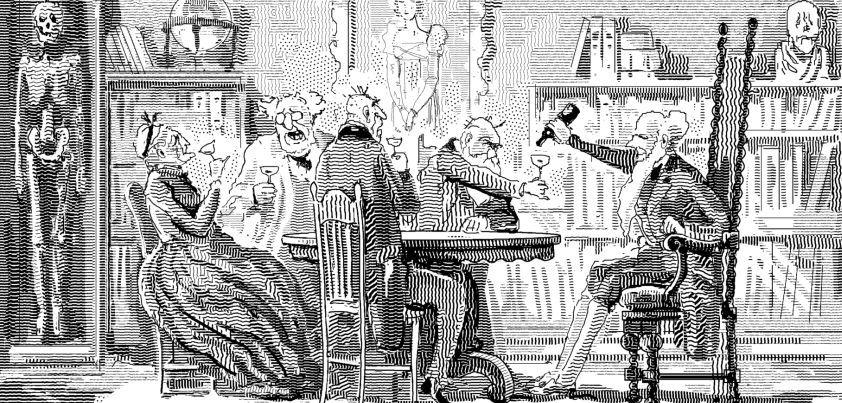 In this story from Nathaniel Hawthorne, an ageing scientist invites four elderly friends to participate in an experiment ostensibly designed to test the efficacy of the waters of the fabled fountain of youth. The inclusion of several supernatural elements clouds whether the effect of the water was real, imagined or faked by substituting alcohol. However, as each friend had a major character flaw in their youth, it is likely that the experiment had a different thesis, which is supported by their behavior after drinking. Themes: ageing, failing to learn from past mistakes, obsession with youthfulness and appearance, the supernatural. More…
In this story from Nathaniel Hawthorne, an ageing scientist invites four elderly friends to participate in an experiment ostensibly designed to test the efficacy of the waters of the fabled fountain of youth. The inclusion of several supernatural elements clouds whether the effect of the water was real, imagined or faked by substituting alcohol. However, as each friend had a major character flaw in their youth, it is likely that the experiment had a different thesis, which is supported by their behavior after drinking. Themes: ageing, failing to learn from past mistakes, obsession with youthfulness and appearance, the supernatural. More…
The Ones Who Walk Away From Omelas
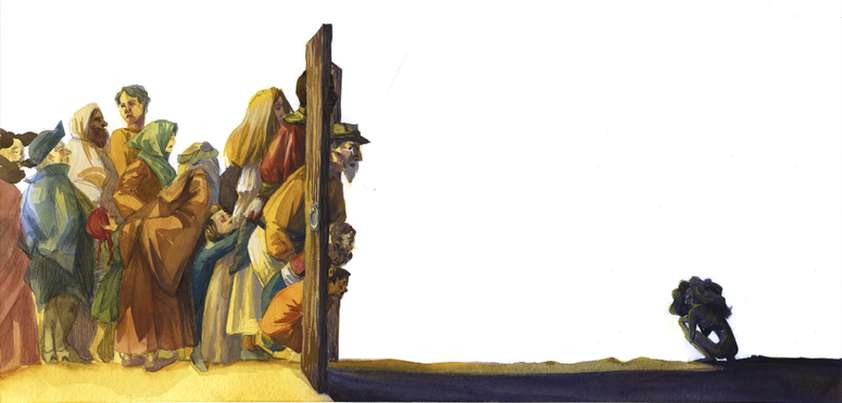 This philosophical narrative by Ursula Le Guin describes life in the seemingly utopian city of Omelas. We learn that almost everyone in the city lives in complete happiness. There is no organized system of rule, few laws, sexual freedom, no crime, no violence, and nobody living in want. Sadly, there is a blight on this “paradise”. For happiness to prevail, a single child must live in absolute misery, locked up alone in an underground cell. Themes: morality and moral compromise (the price of happiness), victimization, complicity (collective knowledge = shared responsibility), guilt, courage (the ones who “walk away”). More…
This philosophical narrative by Ursula Le Guin describes life in the seemingly utopian city of Omelas. We learn that almost everyone in the city lives in complete happiness. There is no organized system of rule, few laws, sexual freedom, no crime, no violence, and nobody living in want. Sadly, there is a blight on this “paradise”. For happiness to prevail, a single child must live in absolute misery, locked up alone in an underground cell. Themes: morality and moral compromise (the price of happiness), victimization, complicity (collective knowledge = shared responsibility), guilt, courage (the ones who “walk away”). More…
The Minority Report
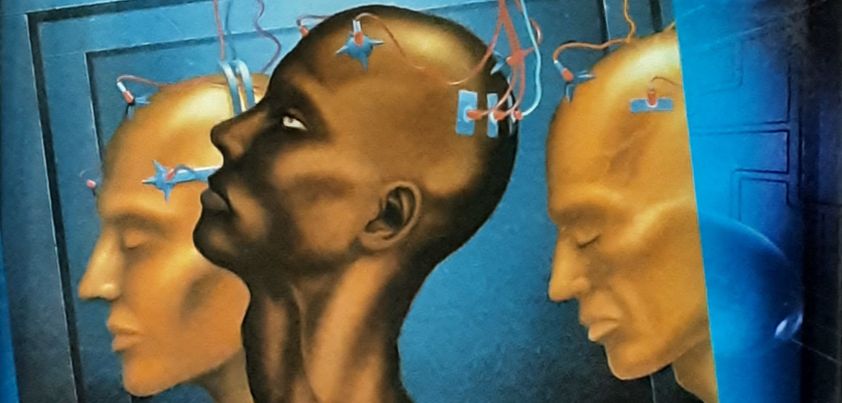 Philip Dick’s The Minority Report is a dystopian adventure story set in a society that takes policing a step even further than the infamous “Thought Police” in George Orwell’s Nineteen Eighty-Four. Its premise is that the authorities have found a way to identify a crime and imprison the would-be perpetrator before he or she even thinks of committing it. Their methods in doing this are disturbing to say the least. Themes: (general) free will vs. fate, injustice, trust vs. paranoia, self-fulfilling prophesy, extrajudicial murder; (for the “precogs”) violation of human rights, enslavement, degradation. More…
Philip Dick’s The Minority Report is a dystopian adventure story set in a society that takes policing a step even further than the infamous “Thought Police” in George Orwell’s Nineteen Eighty-Four. Its premise is that the authorities have found a way to identify a crime and imprison the would-be perpetrator before he or she even thinks of committing it. Their methods in doing this are disturbing to say the least. Themes: (general) free will vs. fate, injustice, trust vs. paranoia, self-fulfilling prophesy, extrajudicial murder; (for the “precogs”) violation of human rights, enslavement, degradation. More…
A Sound of Thunder
 What is the most dangerous thing about time travel? According to this story by Ray Bradbury, it is doing some small thing that may change the future. Five men travel back in time to hunt a T-Rex. One of them panics when he sees the monster and steps off a specially prepared path. Because of this, they return to a very different world. The last thing the clumsy hunter hears is a sound of thunder. Themes include arrogance, cowardice, the dangers of technology, connections between past and present, democracy vs. dictatorship, the ethics of game hunting. More…
What is the most dangerous thing about time travel? According to this story by Ray Bradbury, it is doing some small thing that may change the future. Five men travel back in time to hunt a T-Rex. One of them panics when he sees the monster and steps off a specially prepared path. Because of this, they return to a very different world. The last thing the clumsy hunter hears is a sound of thunder. Themes include arrogance, cowardice, the dangers of technology, connections between past and present, democracy vs. dictatorship, the ethics of game hunting. More…